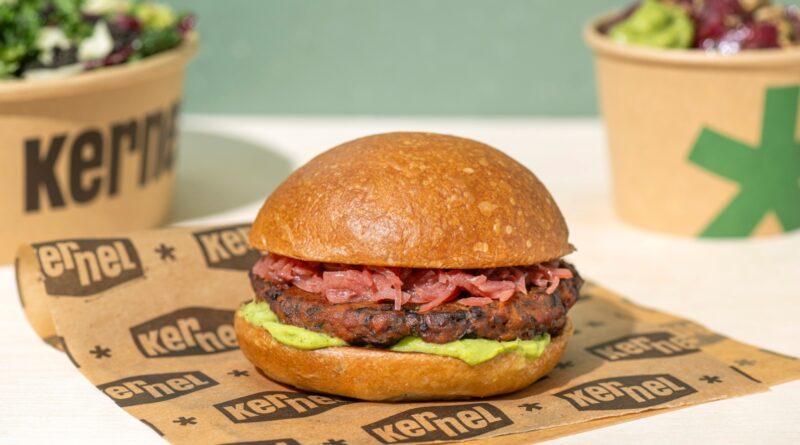Review: We Tried Kernel, Chipotle Founder’s New Robot-Run Restaurant
In a sparse kitchen, a robot arm swings around and grabs a platter of pre-fried soy “chicken” off a rack where it’s resting. In one clean motion, it drops the imitation meat onto a conveyor belt, which takes it through an impingement oven and re-crisps the cutlet. A few feet away, a brioche bun gets toasted for a precise 30 seconds. Protein and bun are released onto a conveyor belt and arrive together in front of a (human) employee, who begins assembling the complete fried “chicken” sandwich.
And with that, your meal is ready. You’ve just met the kitchen team at Kernel, Chipotle founder Steve Ells’s latest attempt to change fast food.
The plant-based restaurant opened its first location a few blocks from Manhattan’s Madison Square Park on February 12, with plans to expand throughout New York City using a $36 million investment from private investment firms and tech companies. The takeout-only spot is betting big on the idea that diners aren’t that interested in human connection during their lunch break—and that they want to eat less meat. The menu hovers between traditional fast food (burgers, fried potatoes) and the vegetable-focused bowl lunches of competitors like Sweetgreen or Dig (salads, composed vegetable dishes).
Much of the hoopla surrounding Kernel has been focused on its investment in robotics. When I visited the restaurant just before opening day, only three humans were working alongside the machines—Ells told me that as technology advances, the kitchen team could become entirely robotic, with employees helping customers and troubleshooting as needed. For now, humans prepare the food at a location off-site; and at Kernel, robots and conveyor belts bring prepared ingredients to workers who assemble them. Those workers place the items in individual cubbies, similar to an automat. When your food is ready, your phone buzzes with a text that reveals which locker is holding your bagged food.
Picking up food from a cubby is nothing new, nor is cooking with robots, but past attempts at automating restaurants and removing human interaction have had mixed success. So are robots the future of fast-casual? Does Ells have another Chipotle-like hit on his hands? The real test, as with any restaurant, is whether the food is any good. The verdict on my recent visit: Kernel is legitimately tasty—enough for me to flirt with the idea of going back twice in one week.
The highlight is Kernel’s veggie burger, a blend of sweet potato, quinoa, chickpeas, kale, mushrooms, and oats, among other grains, legumes, and vegetables. Each bite is seasoned with garlic, chili, onion, and an umami-blast of marmite. This is not an Impossible-style burger trying to mimic beef—it’s a proud veggie burger, with the slight and satisfying mush of a standout version. It’s not crumbly like many other veggie burgers. An avocado-based salsa verde adds a zippy kick, while pink pickled onions provide some crunch. That’s all sandwiched into a pillowy-soft brioche bun. It’s not just good for a veggie burger, it’s a good burger, period.
The menu is rounded out by sides with deceptively simple names but a lot of flavor. A dish called “crunchy cucumbers,” for example, features sliced cucumber tossed with mint and cilantro, a spicy chili jam, and roasted cashews, which all sit on a scoop of rice. Another dish, “roasted carrots,” comes complete with roasted dates, farro, and spiced almonds.
An order of crunchy cucumbers.Photograph by Evan Sung
Also notable are the prices. The veggie burger costs $7, while the “chicken” sandwich (a soy-based fried cutlet with slaw, pickles, and chipotle mayo) costs $9. By comparison, the veggie burger at Shake Shack costs $9.29 in New York. Kernel comes at a time when the industry is investing in tech left and right. Many restaurant executives see AI and robotics as the holy grail: a way to simultaneously cut down labor costs and excise food waste that might come from human error in the ordering or cooking process. Ells told me that using automation to lower costs allows Kernel to pay employees—of which, granted, there are fewer—a living wage, and offer benefits like stock options. Hate it or love it, that automation is at least partly to thank for a $7 burger.
Ells, who left Chipotle in 2020, has fine dining origins. He started his career at Stars, Jeremiah Tower’s famed San Francisco restaurant, and hired Eleven Madison Park alum Andrew Black to oversee the menu here. Still, whether it’s a result of robot cooking or human error, several dishes are a work in progress.
Kernel’s “chicken” sandwich features a soy-based fried cutlet with slaw, pickles, and chipotle mayo.Photograph by Evan Sung
The “chicken” sandwich has an impressive crunch but lacks flavor. Where is the acid in the coleslaw? The bite on the pickles? A side of potatoes, triple-fried so that they’re crisp on the outside but creamy on the inside, was satisfying enough but lacked the salty kick of the best fast-food fries. And though the salad dressings are well balanced, overdressing—by humans, not robots—left the leaves floppy and slightly wilted. For dessert, the chocolate chip and oatmeal cookies would be a nice flourish if they weren’t off-puttingly oily.
If Ells’s track record (and multimillion-dollar investment) is any indication, Kernel’s footprint may soon extend well beyond Manhattan. During his more than 30-year tenure at Chipotle, the chain revolutionized the fast-casual restaurant space while mainstreaming the Mission-style burrito on a national scale. That’s not an easy legacy to follow up, but Kernel is promising. Once the kinks are ironed out with a few robotic tune-ups, it could become a machine-fueled lunchtime institution.

